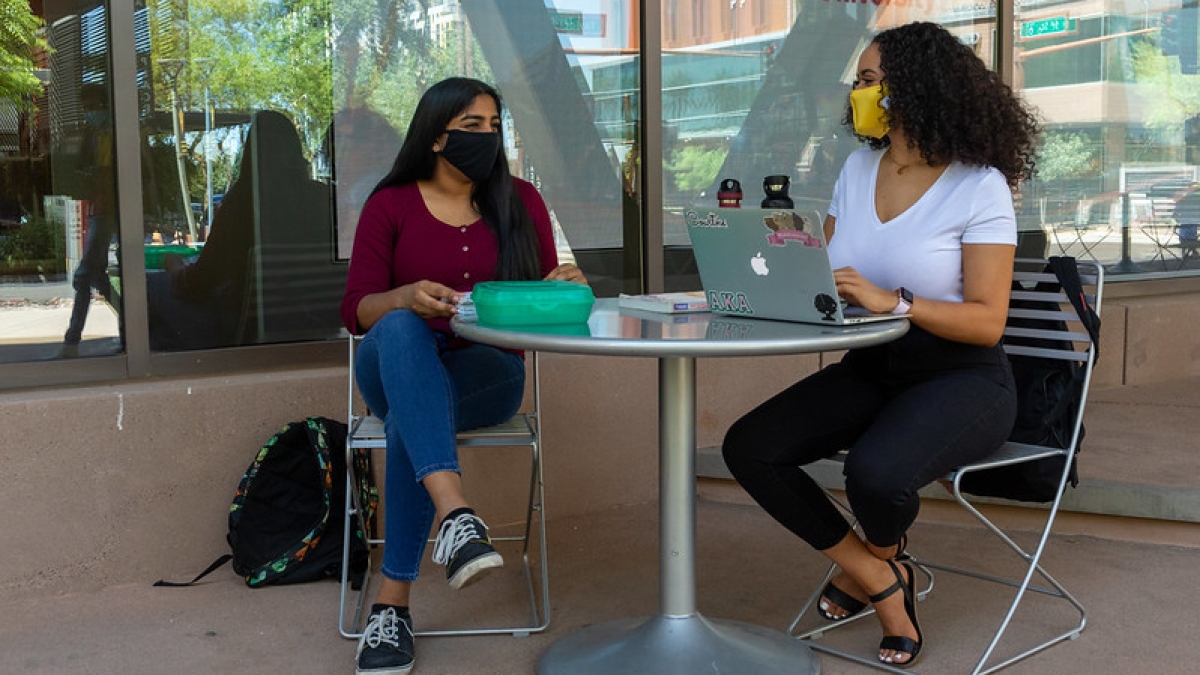You don’t need to be an expert to help students who are in emotional distress, misusing substances or want to change their lifestyle. The C3 training program (short for Compassion Communication Connection) for campus professionals, faculty and student leaders at ASU demonstrates that through the use of a few specific interviewing skills and an empathetic ear you can help to facilitate life-changing conversations with Sun Devils.
The C3 program is designed to provide training for ASU community members to identify and support the needs of students who may be struggling with substance use or other personal challenges that may hinder their ability to be successful in their academic and personal lives. To launch the program, ASU Wellness earned funding from the Arizona Governor’s Office of Youth, Faith, and Family through the Substance Abuse and Mental Health Services Administration State Opioid Targeted Response Grant.
Nursing practice graduate student Tyler Chleborad attended trainings, which launched in 2019, in his last year of undergraduate school — he graduated with a degree in exercise and wellness from ASU in 2019. He utilized the skills he learned to help enhance the resilience of students in recovery during his time as a management intern with Recovery Rising.
The C3 training focuses on the research-based method of motivational interviewing, an empathic method that helps and supports people in recognizing their own motivation to make changes and decisions about their lives. The method emphasizes open-ended questions, affirmations, reflections and summaries, which together prompt people to come to their own conclusions about their priorities and next steps. It’s effective and authentic, said Chleborad.
“Motivational interviewing is a powerful tool in such situations, as it enables the patient to consider their health behaviors in a nonjudgmental environment. This often leads to very honest and blunt discussions surrounding substance misuse,” said Chleborad. “Patients and students who are in recovery or have a history of substance misuse can see right through masqueraded conversational techniques, so remaining authentic while using motivational interviewing practices is of utmost importance.”
Chleborad said he uses the C3 communication method all the time, both in his current role as a graduate teaching assistant and in his personal life to talk to people about difficult subjects. Feedback from faculty and staff who have been trained in the method is resounding: Trainees laud the fact that C3 is people-focused instead of problem-focused, that it eschews power dynamics and giving advice, that it fosters deeper connections with students and that it allows people to talk themselves into making the changes they want to make. Ultimately, self-motivated change is the goal, because people are more likely to follow through if they come to the decision themselves and understand their own motivations.
Video by ASU Wellness
Program Manager Brenda Young and Senior Health Educator Emma Celoza are the ASU staff responsible for the creation, delivery and evaluation of the content provided through C3. They said the inspiration behind creating the program at ASU was to help promote student success. Motivational interviewing asserts that every person has the ability to create their best life and should feel empowered to make their own decisions.
“Through this style of communication, we strive to assist the student in developing their own plan of action to overcome the challenge, igniting the student’s internal motivations to make lasting positive behavior change. We offer multiple training sessions for staff, faculty and student leaders to continue to practice this communication skill,” Young said.
And the effort is already proving effective: In post-training surveys, the majority of participants agreed or strongly agreed that C3 training provided communication strategies they can use to engage others to explore how their behaviors impact their goals.
The trainings are open now and can be customized for different faculty and staff departments. Training time for C3 foundational sessions is two hours; for skill-building sessions, one hour. Chleborad recommends that the entire ASU community take part in the trainings to support students as they navigate collegiate challenges.
“I challenge all faculty at ASU to take the training and become more prepared to have difficult conversations with students who need your help,” he said.
Chleborad said he can’t express how fortunate he feels to have been part of C3 training, especially when using these skills to support a student in recovery. The lessons he learned are ones he’s planning to carry with him as he becomes a registered nurse. He’s grateful to have learned how important support can be for students.
“A single conversation can have a massive impact on a student's trajectory, and it would be amazing if you had a hand in making it positive!” he said.
To schedule a C3 training, please visit wellness.asu.edu/C3. To learn more about the C3 program and how the program can be tailored to meet your team’s needs, please contact Brenda.M.Young@asu.edu or Emma.Celoza@asu.edu.
More Health and medicine
Leading the way in wellness: ASU highlighted in The Princeton Review's 2025 Mental Health Services Honor Roll
Being a college student isn’t easy — navigating new routines, people and places can be a challenge, especially if the right…
New Indigenous health dashboard offers robust database for scholars
By Nicole Greason and Kimberly Linn A team at Arizona State University’s College of Health Solutions and …
College of Health Solutions program doing its part during Salute to Service
It wasn’t always easy for Marine veteran Chuck Hale when he first returned to civilian life. But he’ll never forget the help he…
